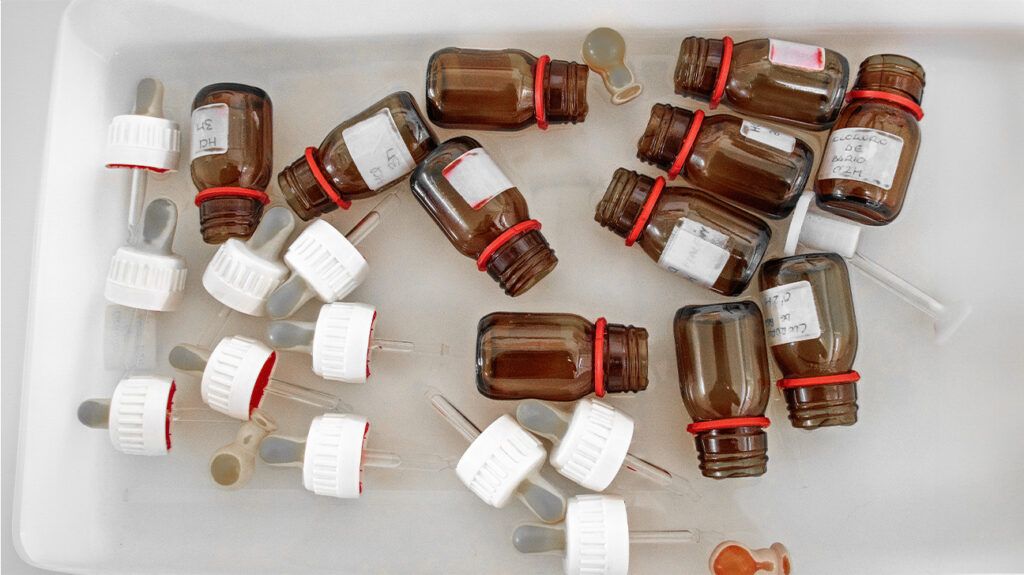Embalming fluid is one street name for liquid forms of PCP that dealers dip cigarettes in, but people sometimes use actual embalming fluid for similar mind-altering effects.
Phencyclidine (PCP) is an illegal substance that people use recreationally for its mind-altering effects. In the
Both can produce similar mind-altering effects and potentially fatal side effects and complications when somebody smokes them.
This article explains what embalming fluid is and its history with substance misuse, short- and long-term side effects, and information on substance use disorder (SUD).

Liquid PCP and embalming fluid are not the same thing, but they do share a connection in substance misuse.
People use embalming fluid to preserve or prevent the decomposition of bodies following death — either for viewing before a funeral or for scientific purposes. Embalming fluid contains a mixture of different chemicals such as formaldehyde, methanol, and ethanol.
PCP is an abbreviation of phencyclidine. Doctors used phencyclidine as an intravenous anesthetic in the 1950s, but discontinued its use due to the high rate of postoperative incidents of erratic behaviors and hallucinations.
Since then, people who wish to use PCP recreationally for its psychoactive effects may dip tobacco or marijuana cigarettes into actual embalming fluid, PCP, or a combination of both. This is
The practice of dipping marijuana cigarettes into PCP traces its origins back to the 1970s. At the time, drug dealers and people with SUD referred to laced or dipped cigarettes as being dipped in “embalming fluid.”
At this point, dealers did not use actual embalming fluid. Researchers speculate that the practice of using embalming fluid, such as formaldehyde, came from confusion surrounding the slang and eventually using embalming fluid, either with or without PCP.
Dipped cigarettes can lead to hallucinations and other mind-altering effects. People also report feeling detached from reality, as well as a sense of invulnerability and incredible strength.
PCP can lead to several short-term side effects. Some common effects include:
- numbness
- slurred speech
- increased heart rate
- rapid, involuntary eye movement
- catatonic posturing
- elevated temperature
- blank stare
- shallow, rapid breathing
- loss of coordination
- increased blood pressure
- hallucinations
If someone smokes or inhales PCP, symptoms can start within
People who smoke cigarettes dipped in embalming fluid may experience symptoms and side effects that can include:
- impaired coordination
- inflammation and sores in the throat, nose, and esophagus
- bronchitis
In severe cases, smoking embalming fluid
Long-term use of PCP can lead to long-term health risks such as:
- depression
- persistent speech difficulties
- anxiety
- suicidal thoughts
- social withdrawal
Suicide prevention
If you know someone at immediate risk of self-harm, suicide, or hurting another person:
- Ask the tough question: “Are you considering suicide?”
- Listen to the person without judgment.
- Call 911 or the local emergency number, or text TALK to 741741 to communicate with a trained crisis counselor.
- Stay with the person until professional help arrives.
- Try to remove any weapons, medications, or other potentially harmful objects if it’s safe to do so.
If you or someone you know is having thoughts of suicide, a prevention hotline can help. The 988 Suicide and Crisis Lifeline is available 24 hours a day at 988. During a crisis, people who are hard of hearing can use their preferred relay service or dial 711 then 988.
When smoking a cigarette dipped in embalming fluid (such as formaldehyde), a person may experience several severe health effects, including:
- increased cancer risk
- damage to lungs
- brain damage
- body tissue destruction
SUD involves the repeated misuse of either drugs or alcohol which can lead to fatal complications, such as respiratory failure and death. In 2020, an estimated 17 million United States adults experienced a combination of mental illness and SUD.
Though people can present differently, some common signs of SUD include:
- social or familial withdrawal
- feeling a need to use the drug to function
- sudden changes in behavior
- experiencing withdrawal symptoms
- high tolerance
- engaging in behaviors that may have harmful effects
A person living with another mental health illness may experience additional symptoms.
SUD often requires treatment. Treatment can help stop misuse and prevent additional health complications.
Interventions for SUD can include:
- detoxification, or removal of the substance from the system
- psychotherapy, or “talk” therapy
- joining support groups
- medications
- inpatient rehabilitation
Some starting points for help with SUD include Narcotics Anonymous or SMART Recovery. Both organizations offer support groups and additional resources to help with addiction.
Embalming fluid is a street name for PCP when dipping cigarettes into its liquid form. However, people may use actual embalming fluid, such as formaldehyde, with or without PCP to create a laced cigarette.
Both embalming fluid and PCP can create mind-altering effects if a person smokes them. They can also both cause potentially fatal symptoms and complications, such as respiratory failure and organ damage.
Treatment can involve talk therapy, detoxification, and support groups. Some people may benefit from inpatient rehabilitation. A person should consider seeking help if they suspect they have developed SUD.
